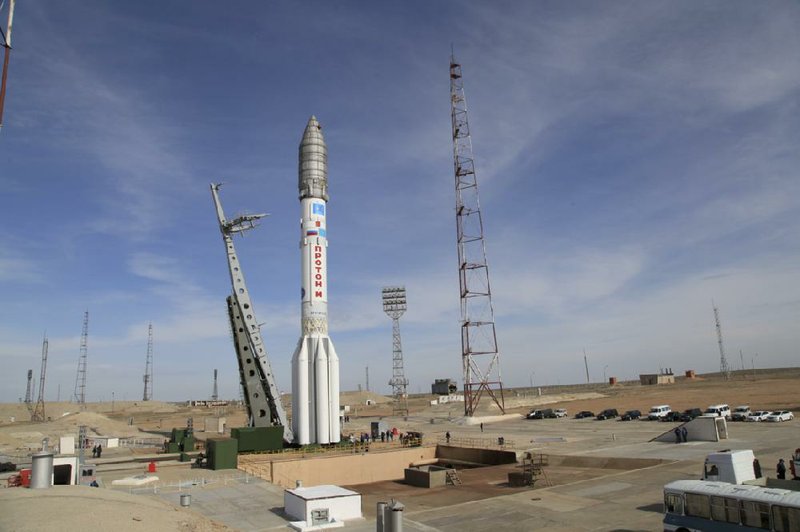KIEV, Ukraine -- A Russian rocket carrying a Mexican satellite malfunctioned Saturday shortly after its launch -- the latest blow to hit Russia's space industry.
The rocket, a Proton-M, was launched from the Russia-leased Baikonur launchpad in Kazakhstan. Roscosmos, the Russian Federal Space Agency, said a problem involving steering engines occurred in the rocket's third stage about eight minutes into its flight, 97 miles above the Earth. The agency said the rocket and Boeing-constructed satellite did not reach their planned orbit of 110 miles, and almost all of the debris from the two burned up in the atmosphere.
A search for debris was conducted in the Zabaikalsky region of eastern Siberia, bordering Mongolia and China, after people there reported hearing loud claps at the time of the launch. The federal agency leading the search said no debris had yet been found.
The Proton rocket is the mainstay transporter for International Launch Services, a joint Russian-American satellite carrier business. The satellite, called Centenario, was being sent into orbit on behalf of Mexico's Ministry of Communications and Transportation and had been manufactured by Boeing Satellite Systems.
According to a statement issued by International Launch Services before the launch, it was intended to provide "mobile satellite services to support national security, civil and humanitarian efforts and will provide disaster relief, emergency services, telemedicine, rural education and government agency operations."
The Proton-M is regarded as a workhorse but has encountered numerous problems in its decades of service. In 2013, a leadership shake-up at Roscosmos was prompted in part by the fourth failed launch of a Proton-M rocket in three years.
Officials said further launchings would be suspended until the cause of Saturday's crash was determined.
The most recent failed launch of a Proton-M occurred exactly a year ago, also caused by a problem in the rocket's third stage. Since then, there have been six successful flights.
The Interfax news agency quoted industry sources saying the failure could result in the suspension of all coming Proton-M launches, including the next one in June for a British satellite.
Russian Prime Minister Dmitry Medvedev ordered a commission be set up to determine the cause of the rocket failure.
Mexico's secretary of communications, Gerardo Ruiz Esparza, stressed that the satellite was completely insured and that the country would not suffer any financial loss. The statement did not mention the cost, but the satellite was one of three that Mexico ordered from Boeing in 2010 in a $1 billion deal covering the satellites and operating costs.
The ministry said it was still planning to launch another communications satellite, Morelos 3, from Cape Canaveral, Fla., in October aboard a Lockheed Martin rocket.
In a separate incident Saturday, Roscosmos also reported that a Progress spaceship attached to the International Space Station failed to ignite its engine, thus failing to adjust the station's orbit. The agency said it was looking into why that happened but added that the space station's crew was not in any danger from the incident.
Russia's space program has seen a string of launch failures in recent years.
In April, an unmanned Russian cargo ship carrying 3 tons of supplies failed to dock with the International Space Station after it went into an uncontrollable spin after the launch.
That failure prompted Roscosmos to delay both the landing of some of the space station's crew and the launch of their successors. Agency chief Igor Komarov said the April 28 launch failure was caused by a leak of fuel tanks in the Soyuz rocket's third stage. Left in low orbit, the Progress cargo spaceship fell to Earth over the Pacific on May 8.
Due to that failure, a Russian official said three of the orbiting space station's six-person crew, who had been scheduled to return to Earth in early May, were asked to stay in orbit until early June, and the launch of the replacement crew was pushed back from late May to late July.
Information for this article was contributed by Nataliya Vasilyeva and Lynn Berry of The Associated Press and by David M. Herszenhorn and Randal C. Archibold of The New York Times.
A Section on 05/17/2015
